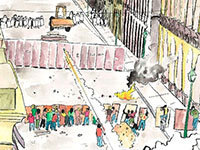I'm just reading around, getting a feel for the Internet again after some good time away. This tick list of potential problems that Google poses to the online community caught my attention at Mostly Water, a site I've only discovered just now.
I don't know enough (a phrase I catch myself repeating with alarming regularity in these posts) about how Google works to evaluate the real risks of the nine items on this list, but the points come across as salient enough to provoke my ever-suspicious imagination to wonder if Google might not be on a track that runs counter to the best privacy interests of Internet users. Especially interesting are points 2, 4 and 9:
2. Google records everything they can:
For all searches they record the cookie ID, your Internet IP address, the time and date, your search terms, and your browser configuration. Increasingly, Google is customizing results based on your IP number. This is referred to in the industry as "IP delivery based on geolocation."
I've long wondered about how search results are compiled specifically for each user, and not based solely on search terms entered but on past search history, results viewed and websites visited. On the surface this sounds like a good way to get the user what he or she most wants or needs. But don't we all also long for new sources we haven't seen before? Don't we need to break out of last month's information cycle to make next month's commentary more interesting? I hate the thought that I'll be forever checking my news analysis against the same half dozen websites I visit most frequently.
4. Google won't say why they need this data:
Inquiries to Google about their privacy policies are ignored. When the New York Times (2002-11-28) asked Sergey Brin about whether Google ever gets subpoenaed for this information, he had no comment
Posted without comment, except to say that I wish the author had provided a link to the article. (
Here's one. The comment referenced is on page 2 of the article.)
9. Google is a privacy time bomb:
With 200 million searches per day, most from outside the U.S., Google amounts to a privacy disaster waiting to happen. Those newly-commissioned data-mining bureaucrats in Washington can only dream about the sort of slick efficiency that Google has already achieved.
Emphasis mine. This seems about right. Isn't it only a matter of time until
Google's user information database and archives get hacked and published for full public consumption like some Washington Madame's little black book? Or, worse yet, subpoenaed by our government?
The complete list is concise, thoughtful and clearly presented. I have no idea if all the statements check out, but they seem to be in keeping with past concerns I've heard about Google. Food for thought, certainly, and points to watch in the future.





